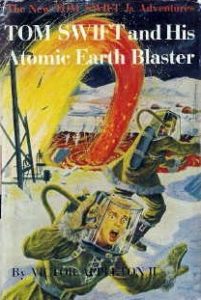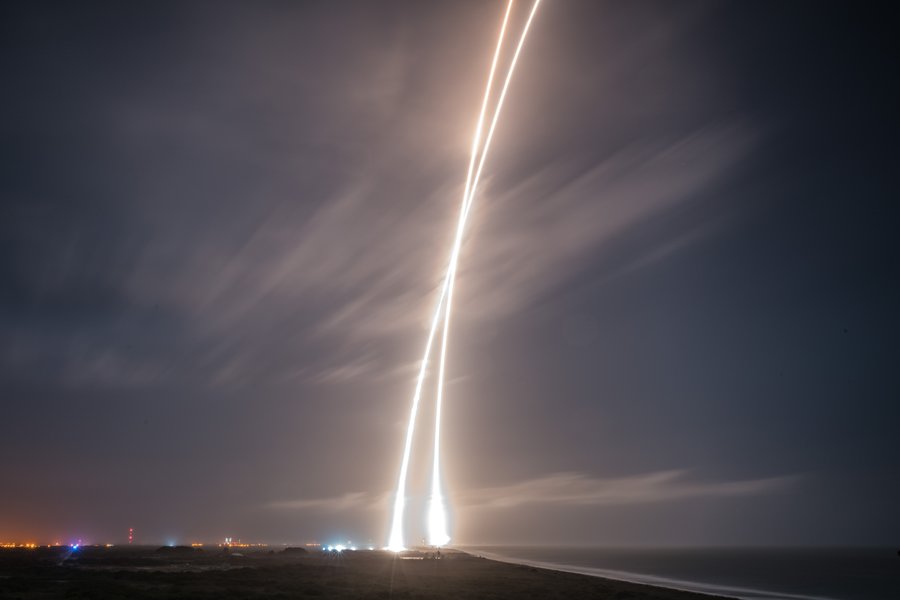A Hopeful Future
Everyone kn ows the Hardy Boys books (and if you don’t, then you have my pity). Something about those books were very endearing and I gobbled up every single one in my county library system. There is another literary comrade of the Hardy Boys that many people may not know named Tom Swift, Jr. His father, Tom Swift, Sr. was the protagonist of a popular series in the early 20th century, having all sorts of adventures involving his inventions. The second series, centering around his son, was far more high-tech and far-reaching, with Swift, Jr. heading out to space and to the depths of the ocean. Jules Verne would have loved these books.
ows the Hardy Boys books (and if you don’t, then you have my pity). Something about those books were very endearing and I gobbled up every single one in my county library system. There is another literary comrade of the Hardy Boys that many people may not know named Tom Swift, Jr. His father, Tom Swift, Sr. was the protagonist of a popular series in the early 20th century, having all sorts of adventures involving his inventions. The second series, centering around his son, was far more high-tech and far-reaching, with Swift, Jr. heading out to space and to the depths of the ocean. Jules Verne would have loved these books.
The Tom Swift, Jr. adventures are a classic example of post-WWII can-do American spirit and ingenuity, with challenges identified and overcome, and new discoveries over every horizon. It was very positive and hopeful science fiction in an age where fiction was continually becoming fact.
Somewhere between then and now, things took a darker turn. The Robot in Lost in Space gave way to Schwarzenegger’s Terminator. Close Encounters of the Third Kind was replaced by Independence Day. There has always been a fear of alien invasion and intelligent machines in science fiction, but they were usually campy and implausible, and there were just as many stories about gee-whiz technology and helpful alien races. In the annals of modern entertainment, you have to look hard to find benevolent extraterrestrials and friendly robots.
I’m not a historian or psychologist, but it seems that the excitement about a distant high-tech future evaporated and left a nervous fear about a high-tech future that wasn’t so distant anymore. Things like alien invasions were still the stuff of imagination, but as our world seemed to be less and less worth saving, we projected those perceptions onto the visitors from out of town. After all, would you give Earth a second glance if you were cruising by in your saucer? Probably just to blow it to pieces, the same way we would slap a spider off its web as we walked past. Throw in ubiquitous surveillance, information overload, social isolation, and rampant Internet fantasies, and the future isn’t looking so rosy anymore.

The first-ever launch and landing of the same space rocket.
Movies, books, and TV reflected this change, and while it wasn’t all doom-and-gloom, there seemed to be little hope for humanity’s future in our entertainment. The post-apocalyptic genre took off, and artificial intelligence became a menace lurking in the shadows of the near-future, just waiting to exterminate us fragile fleshy blobs ruled by emotion and driven by animal instincts. Things were looking especially grim around the turn of the millennium, when we were faced with the first real technological threat that we couldn’t control. Thankfully it didn’t pan out, but for how long? Skynet had to be only a few keystrokes away.
Now, as the sun sets on 2015, I’m sensing a bit of a shift again. We made it through Y2K, 9/11, and 2012. Terrorism, politics, and climate change threatens the world in varying degrees, and smartphones rule us with an iron fist, but the scientific future isn’t looking as bleak as it once did. Major figures like Stephen Hawking, Bill Gates, and Elon Musk have warned about dangerous AI, but we are also seeing huge advancements that make a hopeful future seem closer than before. Mars exploration is getting a lot of attention. 3D printing is making Star Trek’s replicator a reality. SpaceX recently landed a rocket after shooting it up into space. Computer graphics and virtual reality are becoming nearly indistinguishable from the real thing. There is a lot of cool stuff happening, and it seems to me that a more positive view of science is rippling across society.
Look at the entertainment and media that has been released in the last couple of years. Movies like Interstellar, Gravity, and The Martian depict space travel and exploration as something to be embraced, not feared, even when things go wrong (of course, there will always be movies like Prometheus, but even then there was the thrill of discovery). The robots in Ex Machina and Chappie worked; it was the humans around them that were the problem. I don’t see too many freaky sci-fi stories in the year’s best-of lists. Steampunk, with its analog craftsmanship and eager appetite for invention, is exploding as it echoes the excitement of times in our history that were defined by technological and mechanical ingenuity.
As Christians, we should also delight in the advancements made in science and technology, though not always in their application. Understanding God’s creation can be a profound act of worship, and creating in order to engage our imaginations and benefit humanity is something to be celebrated. Science is not a threat to the Christian worldview, since God is the author of all truth. Anything that is discovered will lead to Him, and anything invented reflects the creativity inherent in all humans being made in His image.
I’m not saying things are getting better. All of creation groans, and I don’t expect the physical or moral decay around us to improve on its own. But I am glad that people are getting more excited about science and science fiction. Anything but those loathsome teenage vampires…







































OH I HATED PROMETHEUS! UGH!
I wrote an essay back in the late 90s about the shift in perspective in SF movies like The Day The Earth Stood Still to Independence Day and so on – to me it seemed less like technological fear than arrogance in our capabilities increasing. But I love you bringing in Christianity and science at the end. Too many think that science is actively against God whereas I believe He delights in us learning and understanding His creation.
Very true.
Very cool perspective. When cyberspace replaced outer space, things got real. We turned the world into a giant brain and felt there’s nothing we can’t achieve. But as Ian Malcolm said in Jurassic Park, “They were so preoccupied with whether or not they could, they didn’t stop to think if they should.”
Also, there’s the postmodernist angle. Baudrillard taught that we’re living in a meaningless simulation of recycled ideas that have no reference to their original concepts, and he was pretty much right. Earth is completely mapped and known, and Modernist know-it-all academia pretty much claims to know the essential truth of all past human history and pre-history, as well as the cosmology of the universe. As Baudrillard put it, the map is bigger than the territory. We’re just commenting on what is already known and has already been said many times over. We can only rediscover old connections. We can’t forge into truly new territory.
That’s why the allure of space travel is so strong, but I suppose the Modernistic/postmodern mindset pre-emptively precludes the experience of majesty or transcendence when considering the truly unknown.
I read a short story by Philip K. Dick where the angst caused by the lack of other civilizations or inhabitable worlds in the universe caused the far-future society to tear itself apart. First, they started making miniature “universe globes” in which they started miniature big bangs and watched entire galaxies with planets and civilizations rise and fall, and when that too got boring they started just smashing the globes to destroy what they had created. I forget the title, but it was spot on! All we can do is create virtual worlds, and when that too becomes meaningless, our creations just get more dark and cynical and violent.